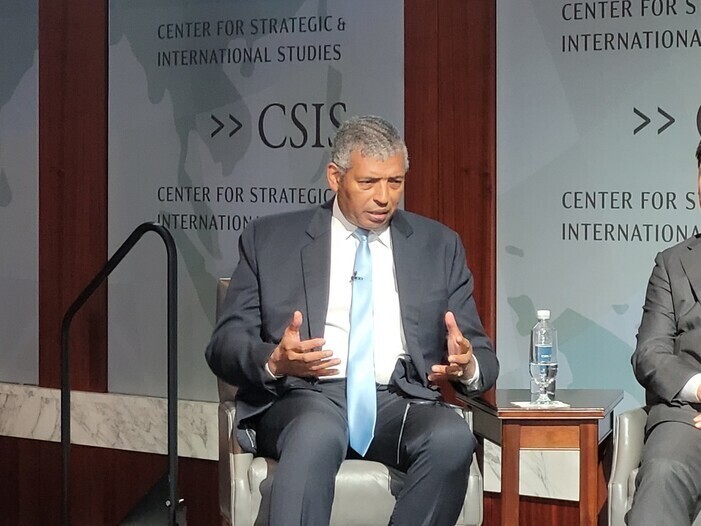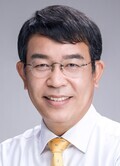hankyoreh
Links to other country sites 다른 나라 사이트 링크
[Column] Unsettling moves by the UN Command lay way for Korean involvement in Taiwan


By Kim Jong-dae, visiting scholar at Yonsei Institute for North Korean Studies
Former US Forces Korea commander Gen. Vincent K. Brooks made a significant statement during the ROK-US Strategic Forum held in Washington, DC, on Sept. 25. He proposed establishing a “Far East command” that would direct both American forces in Korea and Japan.
This means the trilateral summit that South Korea had with the US and Japan at Camp David last August created ripe conditions for discussing a new joint command system. As an alternative if creating a “Far East command” is not possible, Brooks proposed using the existing UN Command as a joint command body.
The things that Brooks was calling for fall in the same context as Japan’s attempts to increase its voice on the Korean Peninsula with the operation of eight UNC rear bases on its own territory.
Brooks’ period as USFK commander saw several attempts at changes meant to turn the UNC into a kind of multinational military command. During the Moon Jae-in presidency, he made a rather unexpected appointment when he invited an officer from Germany — which is not even a UNC member country — to work in the UNC staff section. This showed hints of his aim of turning the UNC into more than simply a military command, but an international security body connected to NATO in Europe.
You can almost see Japan’s “Rising Sun” flag flying behind Brooks. There are also even more significant changes afoot.
At a September 2022 video symposium held by the US Institute for Corean-American Studies, current USFK commander Gen. Paul LaCamera answered a question about preparations for a possible Chinese invasion of Taiwan by stressing that commanders and leaders create emergency plans for every kind of situation. He also defined his duties as defending the Korean Peninsula and preserving peace, stability and security in Northeast Asia.
This amounted to a declaration that the scope of USFK’s duties has been expanded beyond the Korean Peninsula to include the defense of Taiwan. He even seemed to have in mind the possibility of the South Korea-US Combined Forces Command transforming into a command overseeing rear support duties in the event of a crisis in Taiwan.
I can only wonder what sort of discussions and agreements the South Korean government engaged in amid this expansion of USFK’s duties to cover the whole of Northeast Asia.
The focus of all these developments has been on South Korea, the US, and Japan jointly forming an emergency plan for a situation in Taiwan. The objective and concept of integrating the three sides’ activities in the event of a Taiwan crisis has actually existed for some time; the plans have simply been kept confidential to avoid provoking Beijing.
It appears very likely that the UNC will be in charge of duties for encouraging a military readiness posture — including the joint stockpiling of military supplies — as the three sides formulate a joint operational plan for a Taiwan crisis.
The US views bilateral alliances like the one it has with Korea as historical relics. With the rapid erosion of its military advantage over China in East Asia, it has been revamping its military policies along “minilateral” alliance lines, as seen with AUKUS (Australia, the UK and the US), the Quad (the US, India, Japan and Australia), and its trilateral security cooperation body with South Korea and Japan.
Along the same lines, the UNC and CFC have been shifting to conform to the role of multilateral alliances serving to contain China within Northeast Asia.
Japan may hope to direct the situation in Northeast Asia with its profusion of strategic rhetoric, but it’s very likely that South Korea will end up stuck with the dirty work.
According to Asia Power Index ratings by Australia’s Lowy Institute in 2021, South Korea came in second place (3.3 points behind the US) among East Asian countries in the category of “training, readiness, and sustainment,” while Japan came in a mere eighth with 78.6 points.
With no real offensive weapons or landing force to speak of, and with difficulties recruiting members, the Japan Self-Defense Forces are less of an active combat unit and more of a command providing planning from the rear. In the case of a crisis in Taiwan, the more likely candidate to make up for shortfalls in US combat capabilities is South Korea.
Recently, Yoon Suk-yeol has been drawn into the US and Japan strategic vision, placing repeated emphasis on the UNC’s war deterrence capabilities and linkages with NATO. The president of South Korea is an evangelist for “armed peace” and its worship of strength — someone who wants to export South Korea’s military capabilities in order to build up prestige.
These activities, with the end of the bilateral alliance era in East Asia and the expansion of collectivism, bear similarities to the alliances of knights as feudal powers prepared for the Crusades during medieval times. They show the collapse of inclusive liberalism, with its respect for different values and norms, expansions of the public’s freedoms, and the elevation of productive vitality through economic interdependence among countries.
Instead, signs are pointing to a return of Cold War-era “security first” attitudes, with the erection of barriers, the incitement of conflicts, and controls on the public.
A security state is fertile ground for the proliferation of Yoon’s “Yongsan totalitarianism,” as controls and surveillance of the political opposition and media become intensified amid an ongoing security crisis.
Security crisis and far-right governing tactics — that’s the chivalric spirit of the current administration.
Please direct questions or comments to [english@hani.co.kr]

Editorial・opinion
![[Column] Samsung’s ‘lost decade’ and Lee Jae-yong’s mismatched chopsticks [Column] Samsung’s ‘lost decade’ and Lee Jae-yong’s mismatched chopsticks](https://flexible.img.hani.co.kr/flexible/normal/500/300/imgdb/original/2024/0512/3017154788490114.jpg) [Column] Samsung’s ‘lost decade’ and Lee Jae-yong’s mismatched chopsticks
[Column] Samsung’s ‘lost decade’ and Lee Jae-yong’s mismatched chopsticks![[Correspondent’s column] The real reason the US is worried about Chinese ‘overcapacity’ [Correspondent’s column] The real reason the US is worried about Chinese ‘overcapacity’](https://flexible.img.hani.co.kr/flexible/normal/500/300/imgdb/original/2024/0510/5217153290112576.jpg) [Correspondent’s column] The real reason the US is worried about Chinese ‘overcapacity’
[Correspondent’s column] The real reason the US is worried about Chinese ‘overcapacity’- [Editorial] Yoon’s gesture at communication only highlights his reluctance to change
- [Editorial] Perilous stakes of Trump’s rhetoric around US troop pullout from Korea
- [Guest essay] Preventing Korean Peninsula from becoming front line of new cold war
- [Column] The state is back — but is it in business?
- [Column] Life on our Trisolaris
- [Editorial] Penalties for airing allegations against Korea’s first lady endanger free press
- [Editorial] Yoon must halt procurement of SM-3 interceptor missiles
- [Guest essay] Maybe Korea’s rapid population decline is an opportunity, not a crisis
Most viewed articles
- 1Seoul’s plan to adopt SM-3 missiles is like wanting a sledgehammer to catch a fly
- 2[Column] Samsung’s ‘lost decade’ and Lee Jae-yong’s mismatched chopsticks
- 3[Correspondent’s column] The real reason the US is worried about Chinese ‘overcapacity’
- 4Korea poised to overtake Taiwan as world’s No. 2 chip producer by 2032
- 560% of young Koreans see no need to have kids after marriage
- 6[Editorial] Yoon’s gesture at communication only highlights his reluctance to change
- 7Yoon voices ‘trust’ in Japanese counterpart, says alliance with US won’t change
- 8Yoon rejects calls for special counsel probes into Marine’s death, first lady in long-awaited presse
- 9S.K.-Japan joint history project to be revived
- 10Former President Roh Tae-woo, mastermind of 1979 military coup, dies at 88